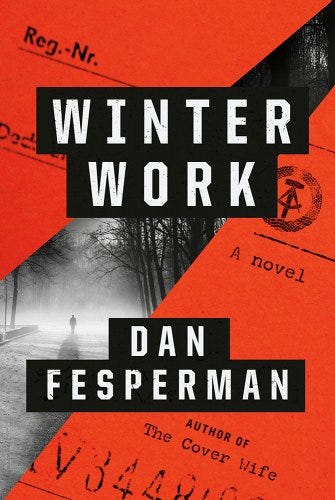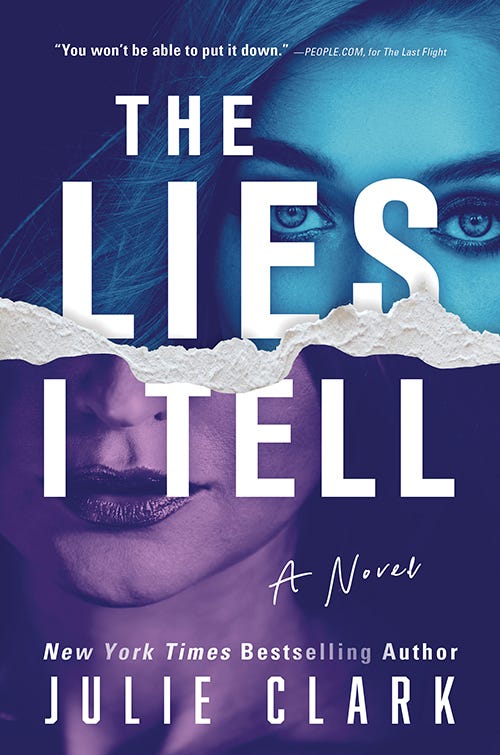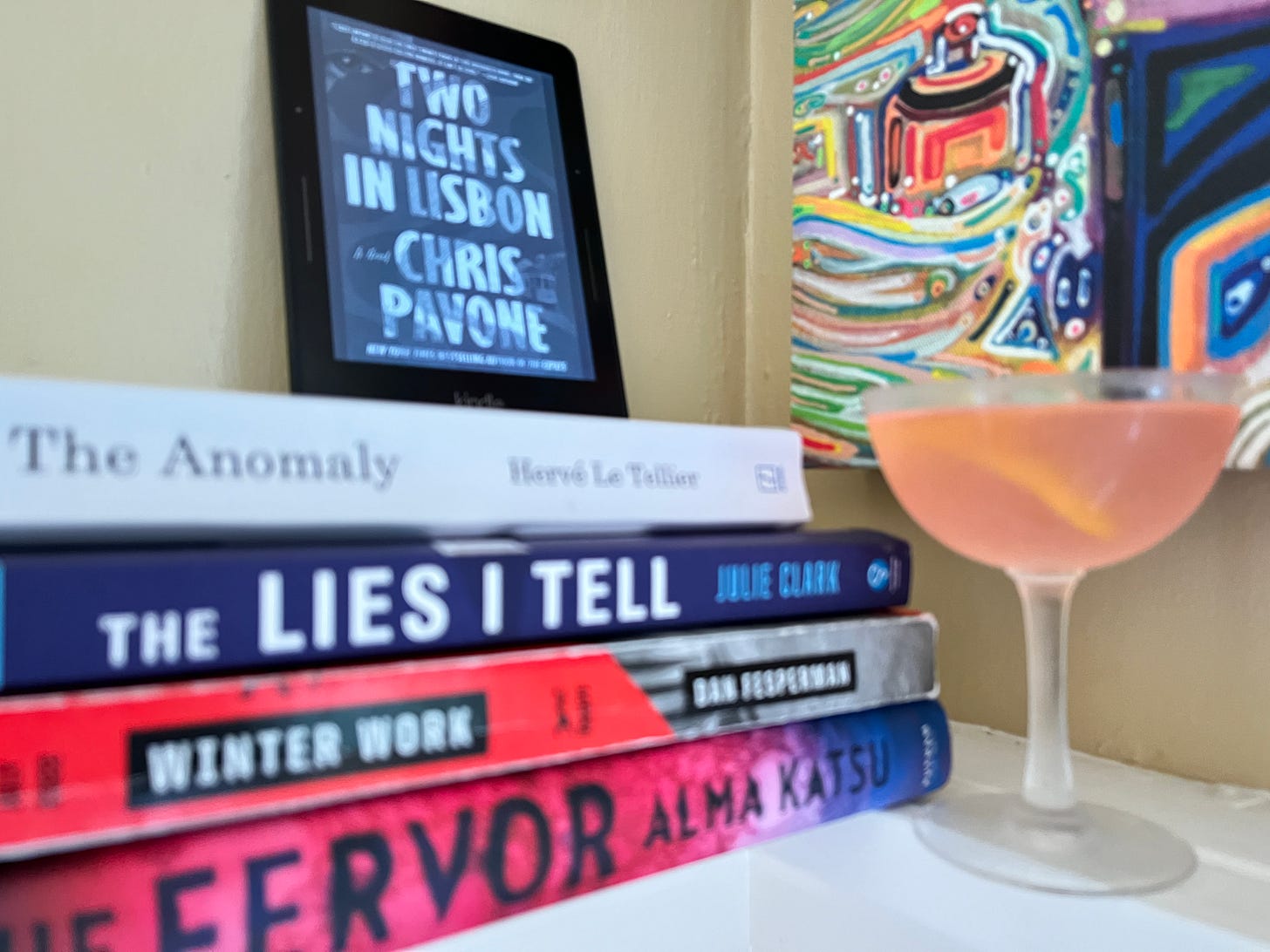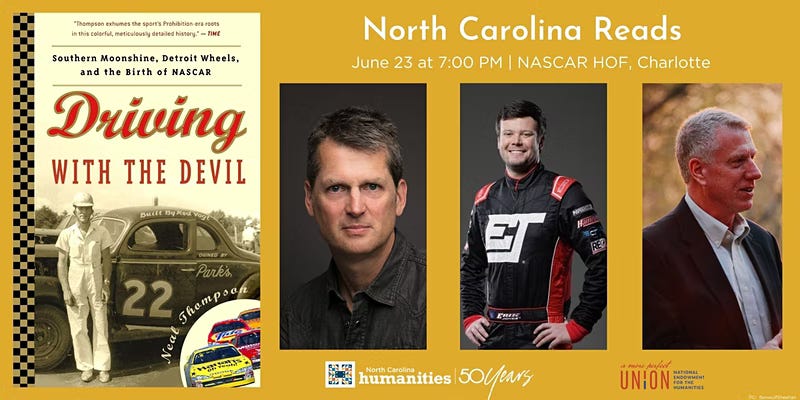Hello friends and readers…
Here in Seattle, we’d just come off the rainiest, coldest May in decades and then June — known here as June-uary — got off to a wet and chilly, record-breaking start, which is saying a lot for a soggy city like Seattle. It’s the first time in 14 years of Pacific Northwest living that I’ve felt worn down by the weather. We’re still wearing down coats here, people! It’s pissing me off. So… I’m starting this month’s newsletter off with a hopeful, Summer Breeze-themed playlist, inspired by the AM radio tunes of my ‘70s New Jersey youth. [Also in honor of Jim Seals, half of Seals and Croft (“Summer Breeze”), who just died - read the NYT obit.]
(best played on shuffle)
Winter Work, by Dan Fesperman
My favorite read of the past month is by my former Baltimore Sun colleague, Dan Fesperman. This is Dan’s 13th book, most of them spy stories, many of them set in Cold War-era Europe, informed by Dan’s years as a Berlin-based foreign correspondent in the mid-’90s. Winter Work is a fine-tuned combination of deep research + compelling, believable, humane (read: flawed) characters + meticulous writing — prose that’s etched and precise. With a Graham Greene-like sense of story and place, it’s got heart and heat as well as an underlying sadness. The Berlin Wall has come down, and Emil Grimm is a soon-to-be unemployed Stasi officer whose colleague has been killed, taking a lifetime of secrets with him. As Emil seeks answers, while caring for his wife, Bettina (dying from ALS), we see East Germany collapsing around him, and the CIA hovering, with agent Claire Saylor joining Emil in an uneasy partnership.
I took a stab at an audio interview with Dan and had a blast discussing not just Winter Work but his time as a foreign correspondent, his literary influences (Greene, Le Carré), and the sad state of today’s newspaper. It’s 20 minutes long:
(* music by Oskar Schroeder)
Two Nights in Lisbon, by Chris Pavone
Big thanks to author Alafair Burke for this guest review. (Alafair’s latest novel is Find Me, which I reviewed in January, along with a mini Q&A with her.)
“Chris Pavone’s addictive new thriller, TWO NIGHTS IN LISBON, begins with a familiar yet still irresistible premise: When a woman’s seemingly perfect husband goes missing, she finds herself wondering how well she knows the man she married. It’s where the novel goes with the set-up that makes this read deliciously Pavonian (I’ve decided that’s a word). The woman in question is Ariel Pryce, but that hasn’t always been her name, and she hasn’t always lived the same kind of life. Her husband, John, has a complicated background, too. And for good measure, the kidnapping goes down in the beautiful, bustling metropolis of a foreign country, adding an extra challenge to Ariel’s search. When the kidnappers demand three million euros in exchange for John’s safety, Ariel has a plan to get the money, but in doing so, risks digging up secrets that were meant to stay buried forever. Once I opened this book, I resented everything else I was supposed to do. I just wanted to read.”
The Lies I Tell, Julie Clark
When we first meet Meg Williams, she tells us: “It starts how it always starts. With me, quietly slipping alongside you — no sudden moves, no loud fanfare. As if I’ve always been there.” That’s how I felt getting to know Meg (and her pursuer, Kat) in this smart, character-driven thriller that manages to be both fast paced and a slow burn of a reveal. (No wonder it’s been scooped up for a series.)
How does someone live with the traumas of their past? How do we survive with the questions that we can’t let go? What drives someone into a life of fake names and new cities and cons? This is a gulp-it-down, don’t-talk-to-me page turner about two strong, wounded women, each seeking to make sense of the past, find justice and the truth, despite the flawed (or worse) men in their lives.
I reached out to Julie Clark for this mini Q&A:
Origins: I was listening to a podcast about a con artist in Australia, a guy who would charm his way into women's lives, convince them to "invest" large sums of money with his company, and then vanish. I remember thinking how easy it seemed for him to prey on women's insecurities, to exploit their weaknesses and then disappear with all of their money. It got me thinking about whether there were any female con artists out there, and if they might be better at it than men. Women are highly intuitive. We're also inherently trustworthy ... and yet simultaneously underestimated by those in power. It seemed like the perfect set up for a con artist.
Mood: A cat-and-mouse story where you're not sure who's the cat and who's the mouse.
Favorite line: "The difference between justice and revenge comes down to who's telling the story."
Risk: Making sure I nailed every detail of the cons my main character, Meg, pulled. The research with experts to ensure that yes, what she was doing would not only work, but work well took a lot of time to figure out and then finesse. But that was also the most fun.
Reading: Recent favorites with new/newish books out: Janelle Brown, Katie Gutierrez, Laura Dave, Kellye Garrett, Joshua Moehling, Alex Finlay.
Two more:
The Anomaly, by Hervé Le Tellier — Spoiler alert! I’m not going to dance around the plot twist, since it comes early enough in the story… A Paris-to-New York flight slams into a storm wall and emerges on the other side and lands safely, except… the same plane and same passengers had already landed three months earlier. Clever and trippy.
The Fervor, by Alma Katsu — A dark and spooky WWII-era story set mostly at a Japanese internment camp in Idaho, where a mysterious disease begins to kill prisoners and strange men lurk. A mix of wartime mystery and historical noir and supernatural thriller with a great cast of characters, led by an internee, her daughter, and a scrappy female reporter.
And in the category of not-so-bloody, mostly-crime-free books…
Also a Poet: Frank O'Hara, My Father, and Me, by Ada Calhoun — this one’s getting lots of well-deserved buzz (including an NYT review & profile). It’s partly the story of Calhoun’s attempt to revive her father’s unfinished biography of poet Frank O'Hara, but mostly it’s her exploration of the complex relationship with her art critic dad, Peter Schjeldahl.
Ma and Me, by Putsata Reang — A nice companion to Calhoun’s story, I just started this buzz-getting memoir about a journalist’s reckoning with her mother, the woman who carried her as a half-dead infant refugee from Cambodia but who won’t accept the (queer) woman she’s become.
What we’re watching: I thought Gaslit (about the Watergate break-in, focused on John Mitchell’s whistleblower wife, Martha, played by Julia Roberts — with a prosthetic-faced Sean Penn as Mitchell) was excellent. And our son turned us on to Barry, the first four episodes of which were a hoot. I’m still looking forward to the new David Simon + George Pelecanos series, We Own This City (also HBO).
Listening to: Dan Fesperman’s novel led me to the excellent podcast Winds of Change by journalist/author Patrick Radden Keefe, about the Scorpions’ post-Berlin Wall fall song “Wind of Change” allegedly having been penned by the CIA.
Cocktail of the Month…
I snagged this one from a Facebook post by another Baltimore Sun chum and alum, Candy Thomson.
The Gellhorn
(created in honor of war correspondent Martha Gellhorn, Hemmingway’s ex)
2 oz dry gin
1/4 oz. maraschino liqueur (I used Luxardo)
3/4 oz grapefruit juice
1/4 oz. lime juice
dash of Peychauds bitters
Shake ingredients with ice, strain into a coupe glass, garnish with a lime wheel.
In news about my latest book: THE FIRST KENNEDYS was just selected by Amazon as one of the top-20 Best Books of the Year So Far (#13).
And I’ll be in Charlotte next week for a June 23 event at the NASCAR Hall of Fame to discuss my 2006 book DRIVING WITH THE DEVIL, which was selected by the NC Humanities Council as a 2022 NC Reads book. Register HERE.
Until next month…
-Neal
Find me on Instagram; sometimes on Facebook, Twitter, LinkedIn, Goodreads








